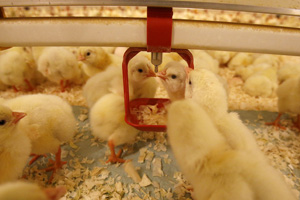Broilers perform better from low temperature drinking water

A trial was conducted at the University of Arkansas, AR, USA, with the objective to determine if the temperature of drinking water during the first four days of life impacts performance of broiler birds.
Two hundred twenty-five day-old male broilers from the Cobb 500 female line were randomly allocated to 9 pens (25 chicks/pen/22 square feet) and grown to 42 days.
The three water treatments provided were: 1): water temperature of 40˚F (4.44˚C); 2): water temperature of 70˚F (21.11˚C); 3): water temperature of 100˚F (37.78˚C).
Water temperature was monitored every hour and adjusted as necessary during the 72 hour treatment period to ensure that the temperature remained near the target. Each pen was provided feed and water ad libitum throughout the grow-out period and birds received a diet series based on the Cobb nutritional standards. All birds received a coccidiosis vaccine on day one. All other aspects of the grow-out were done according to industry standards. Birds were weighed on days 0, 7, 14, 31, and 42 and feed consumption data was also collected for this period.
The results indicated that in treatment 3 chicks were significantly lighter than the other treatments at day 14 (501, 501, 463 grams respectively). While no significant differences were seen with feed conversion or average weights for days 7, 31 and 42, treatment 3 birds had numerically lower weights.
These results suggest that the temperature of drinking water during brooding stage may impact live weights.
Source: Christopher Eagleson, Susan Watkins, Tyler Clark, Malea Frank, Antonio Beitia, University of Arkansas, Fayetteville, AR, USA
Abstracts of the 2014 International Poultry Scientific Forum, Atlanta, GA USA












